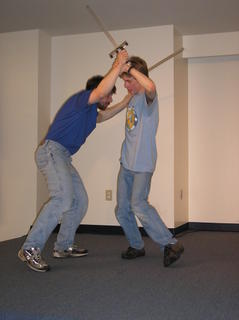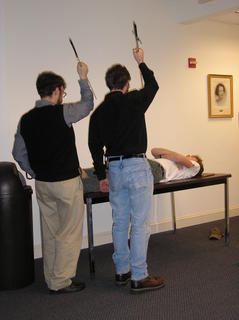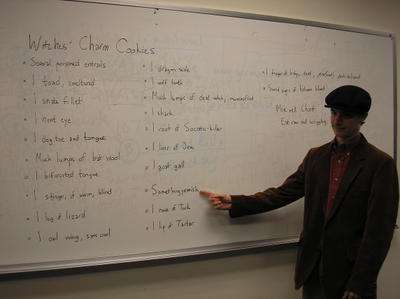I had a thought this morning in chapel. It is not a new thought. We were doing praise songs. Don't get me wrong; I like praise songs, in principle, and there are a few good ones. I also don't want to criticize our song leader this morning, because he did an entirely adequate job, and I'm grateful to him.
Nevertheless, the lyrics we sang today, and many lyrics we sing often, are not good. On a purely literary and technical level, they are sub-par. They possess neither rhyme nor rhythm. They do not draw one's attention to what one is singing. They have no brilliant moments of insight, no skillfully-drawn-out metaphors to make anything become realer or truer to the singer. They feel incompetent. They may or may not be amateur, but they certainly look it.
It is the nature of a song--or indeed any poetry--to be brief (relative to an epic or a novel). It must choose one thing to say and say it as effectively as ever it may. You get this in short story theory: you don't have many words to work with, so every word needs to be doing its duty well and twice and thrice over, doing more than one thing, never ever ever there just as filler. Dr. Hake calls poetry "language at its densest."
You can choose to write a poem in meter or not, as you like, but a poet should be aware that the decision has meaning. (This is like the "intolerable compliment" Lewis speaks of: God has decreed that the decisions human make actually matter eternally.) Critics notice the form of a poem. Syllables halting along in irregular ways reflect the chaos and meaninglessness of the universe. A regular meter with nicely rounded-off phrases tends to reflect a coherent, comprehensible, beautiful universe. One could, conceivably, write a praise song in which form and substance are unified--as in, rough rhythm and mourning over one's sin--but when there is no conceivable design behind word choice--when it is apparently just what the author thought of first, and didn't have the time or skill to refine into anything more meaningful--when one analyzes something according to the rules of its trade and it is found wanting--then a Christian can mourn.
Meter and rhyme schemes help a song, they really do, because then even if the words are a bit uninspired, one can analyze the form and gain edification that way. When the words are, basically, "I love You/ Forever and ever/ You are good and great," --well, this is true, one hopes, but it's really boring.
Also, it occurs to me that when a stanza is repeated, oh, six times in the course of a song, if the words were worth listening to and repeating, that would be better. The unbelievers can do it; even nihilists can craft a piece so that it is a joy to hear and know and memorize. Word choice matters. Mark Twain mocked James Fenimore Cooper for using "a word's second cousin" instead of the word itself. The right word actually emphasizes the point an author is trying to get across. The mostly-right word fogs things.
This comes back to a Christian view of work, I think. It's not just what job is done, but how well one does it. Incompetence depresses. God is pleased for the foolish to shame the wise, but He also demanded skilled workmen to build His temple. Glorify God, people! We wouldn't like a Christian plumber who couldn't keep a pipe from leaking! We wouldn't like a Christian jeweler whose necklaces didn't clasp properly! Just the same, it's annoying to sing songs written by poets who can't tell an iamb from a dactyl, or if they can tell, don't care.
It's really not that complicated, but it does take work. Future lyricists, take note!
Friday, October 28, 2005
Saturday, October 22, 2005
Witches' charm cookies and the Macbeths
Rehearsal goes on apace
 "Maybe that's what it is! The salad makes the poet!" Emily H 10-18-05
"Maybe that's what it is! The salad makes the poet!" Emily H 10-18-05 Our Celtic battle goddesses need cooking lessons, I think. "I just wanted these two! I didn't want her. I only want nice evil spirits." Emily T 10-10-05
Our Celtic battle goddesses need cooking lessons, I think. "I just wanted these two! I didn't want her. I only want nice evil spirits." Emily T 10-10-05 And Tobin dies again. “Maybe I can survive a dramatic production sometime. That’s my ambition. Put that in my brochure bio.” Tobin 10-18-05
And Tobin dies again. “Maybe I can survive a dramatic production sometime. That’s my ambition. Put that in my brochure bio.” Tobin 10-18-05 It may be a bit hard to tell, but here Macbeth throws down the gauntlet to Macduff. Macduff claimed the gauntlets were milking gloves and was not impressed. We made quite a lot of progress choreographing the fight, but there were, as always, the occasional sticking points.
It may be a bit hard to tell, but here Macbeth throws down the gauntlet to Macduff. Macduff claimed the gauntlets were milking gloves and was not impressed. We made quite a lot of progress choreographing the fight, but there were, as always, the occasional sticking points.“Bales? You keep kicking him in the shins.” Emily H
“Well, there’s this pointy sword thing in the way, and I don’t want to kick that by mistake!” Bales 10-18-05
 We really like swords.
We really like swords.Saturday, October 15, 2005
A happy thought
IM might be an excellent cure for free-verse-itis, because it gets people used to seeing short lines without necessarily equating them with literary brilliance.
Blessings all mine, with ten thousand beside
I'm rather happy.
I saw evidences of grace all through last week. Like, God was taking care of me and my doings in ways it never occurred to me needed taking care of, let alone the obvious ways, such as two terrifying midterms, a less terrifying one, and two papers (which got postponed).
Last night I was allowed to go hiking at Raven's Rocks. I'd never been there before. It was a fall evening, like fall rarely is. The leaves were just beginning to turn. There was still plenty of greenery around, and yet the trail was bedecked with bright yellows and fierce reds that stood out against the dark mud like Christmas lights. The woods also varied between stern dark colors and bright wild greens. Then, after a longish uphill walk, one comes out against a valley overlook, nearly mesa-like in its suddenness and sheer drop to the floor below. We amused ourselves by lying on the edge and leaning our heads over--I took off my glasses first, for I wanted to keep them--and admiring the view and talking school politics, of all odd things. Lovely.
I spent a large chunk of the day having sister time, and another large chunk having a quiet time.
I had a good talk with someone; it was not easy, nor pleasant, but it was good and edifying, I hope.
There is a vase full of daisies and honeysuckle on my windowsill. During the sister time, we walked along the trail and picked flowers. Imagine! The middle of October and there are still big yellow almost-sunflowers, and little white daisies, and long strands of honeysuckle, sweet enough to scent a room!
And now I am going up to dinner. It is a good blessing.
I saw evidences of grace all through last week. Like, God was taking care of me and my doings in ways it never occurred to me needed taking care of, let alone the obvious ways, such as two terrifying midterms, a less terrifying one, and two papers (which got postponed).
Last night I was allowed to go hiking at Raven's Rocks. I'd never been there before. It was a fall evening, like fall rarely is. The leaves were just beginning to turn. There was still plenty of greenery around, and yet the trail was bedecked with bright yellows and fierce reds that stood out against the dark mud like Christmas lights. The woods also varied between stern dark colors and bright wild greens. Then, after a longish uphill walk, one comes out against a valley overlook, nearly mesa-like in its suddenness and sheer drop to the floor below. We amused ourselves by lying on the edge and leaning our heads over--I took off my glasses first, for I wanted to keep them--and admiring the view and talking school politics, of all odd things. Lovely.
I spent a large chunk of the day having sister time, and another large chunk having a quiet time.
I had a good talk with someone; it was not easy, nor pleasant, but it was good and edifying, I hope.
There is a vase full of daisies and honeysuckle on my windowsill. During the sister time, we walked along the trail and picked flowers. Imagine! The middle of October and there are still big yellow almost-sunflowers, and little white daisies, and long strands of honeysuckle, sweet enough to scent a room!
And now I am going up to dinner. It is a good blessing.
Thursday, October 13, 2005
A bit of excitement
Well...yeah. This explains it. Incidentally, I have the coolest guys ever on my cast: an RA, an Eagle Scout, and an EMT were all on hand to deal with it immediately.
Tuesday, October 11, 2005
Marian, Macbeth, and midterms
The Marian has just returned home. She is making her way to the airport, and will soon be in the clouds. My room is emptier than it was.
My Macbeth life is full of heroic thanes who do or do not talk too much, swords, tickets, serious lacks of male leadership (Bales is a good actor), and posters, both paper and "of the sea and land." I can't believe I'm encouraging some of this.
Last night we blocked all of Act I and made some very good progress in interpretation. Having witches in the "come to me, you spirits who tend on mortal thoughts" scene helped Lady Macbeth reach new evil and bossy depths. And when Lady Macbeth was doing her thing, it helped Macbeth do his thing more wimpily. Also, I was so pleased with how my actors had their lines memorized! Guys, keep up the good work!
Meanwhile, I have three midterms and two papers starting tomorrow. I think I shall go work on something. Feel free to pray for me if you get an urge. :-)
My Macbeth life is full of heroic thanes who do or do not talk too much, swords, tickets, serious lacks of male leadership (Bales is a good actor), and posters, both paper and "of the sea and land." I can't believe I'm encouraging some of this.
Last night we blocked all of Act I and made some very good progress in interpretation. Having witches in the "come to me, you spirits who tend on mortal thoughts" scene helped Lady Macbeth reach new evil and bossy depths. And when Lady Macbeth was doing her thing, it helped Macbeth do his thing more wimpily. Also, I was so pleased with how my actors had their lines memorized! Guys, keep up the good work!
Meanwhile, I have three midterms and two papers starting tomorrow. I think I shall go work on something. Feel free to pray for me if you get an urge. :-)
Saturday, October 08, 2005
Macbeth rehearsal

Macduff's son is so heroic. Here he's defending his mother from a murderous witch.

Here is Macbeth, the "brutish murderer," maltreating his servants. Doesn't he make a great evil tyrant?

Here the evil tyrant is giving my co-directress a fencing lesson. Swords are seriously cool.

This is Macduff with his (practice) sword. Macduff is the one who kills Macbeth in the last scene.
Subscribe to:
Posts (Atom)




